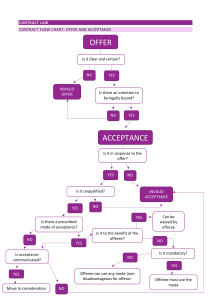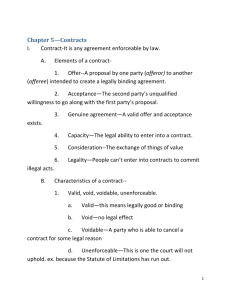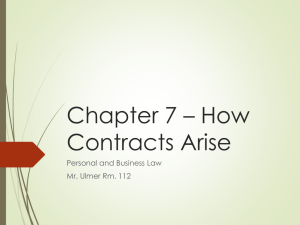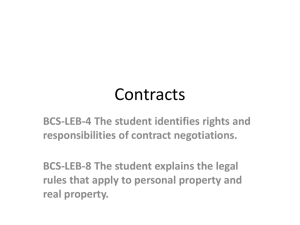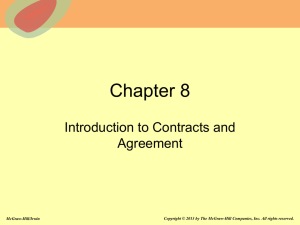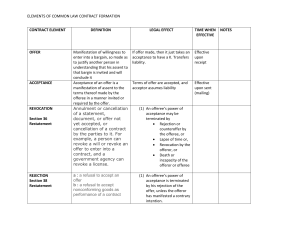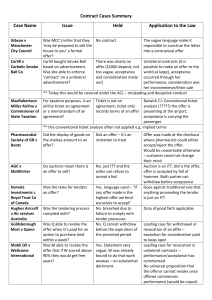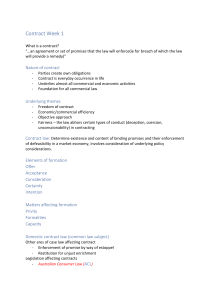Business Law Chapter 4 Study Guide
advertisement
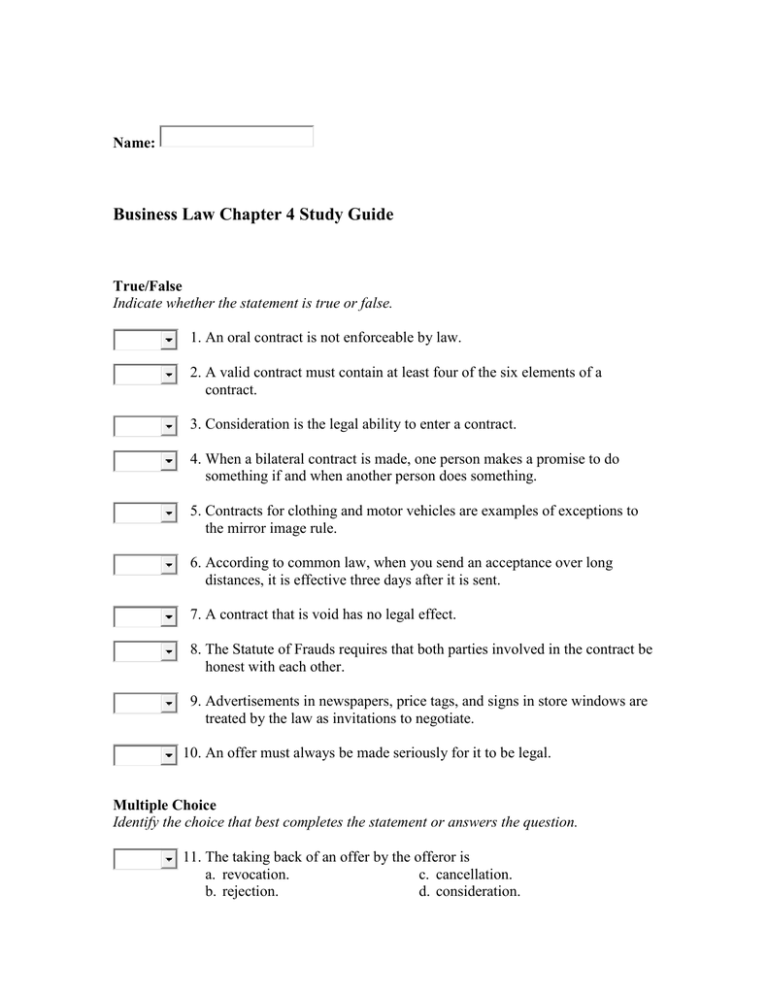
Name: Business Law Chapter 4 Study Guide True/False Indicate whether the statement is true or false. 1. An oral contract is not enforceable by law. 2. A valid contract must contain at least four of the six elements of a contract. 3. Consideration is the legal ability to enter a contract. 4. When a bilateral contract is made, one person makes a promise to do something if and when another person does something. 5. Contracts for clothing and motor vehicles are examples of exceptions to the mirror image rule. 6. According to common law, when you send an acceptance over long distances, it is effective three days after it is sent. 7. A contract that is void has no legal effect. 8. The Statute of Frauds requires that both parties involved in the contract be honest with each other. 9. Advertisements in newspapers, price tags, and signs in store windows are treated by the law as invitations to negotiate. 10. An offer must always be made seriously for it to be legal. Multiple Choice Identify the choice that best completes the statement or answers the question. 11. The taking back of an offer by the offeror is a. revocation. c. cancellation. b. rejection. d. consideration. 12. A contract that amounts to nothing and has no legal effect is a. unenforceable. c. void. b. voidable. d. unilateral. 13. A contract that contains a promise by both parties is a. express. c. bilateral. b. implied. d. unilateral. 14. To be effective, an offer must be communicated to the a. attorney. c. lender. b. offeree. d. offeror. 15. In order for the acceptance to be legally binding, it must be a. made in person and in writing by the offeree. b. unconditional and in writing by the offeror and offeree. c. made in person and follow the rules regarding the method of acceptance. d. unconditional and follow the rules regarding the method of acceptance. 16. If you wait too long to bring a lawsuit, the court may not uphold it because it could be a. unenforceable. c. voidable. b. limited. d. fraudulent. 17. Your friend has lost her bracelet and offers you a reward of $50 if you find it. This is an example of a(n) a. bilateral contract. c. acceptance contract. b. unilateral contract. d. revocation of a contract. 18. In China, when people sign a contract, it means a. all parties know what to do and by when. b. they are ready to fulfill the contract. c. that everyone will complete the requirements of the contract. d. they simply want to do business with each other. 19. In contract law, consideration can be defined as a. the thing of value promised in exchange for something else of value. b. anyone who enters into a legal contract has the ability to do so. c. contracts that involve illegal acts are not allowed. d. both parties communicating clearly when entering into a contract. 20. Invitations to deal, trade, or make an offer by the seller are considered invitations a. of legality. b. to negotiate. c. to make a counteroffer. d. for consideration. Completion Complete each statement. 21. Any agreement enforceable by law is a(n) ____________________. 22. People sometimes enter into ____________________ contracts without exchanging a word. 23. Requesting a change in terms is the same as making a(n) ____________________. 24. The offeree's refusal, or ____________________, of an offer ends that offer. 25. A contract is ____________________ if it can be canceled by one of the parties. 26. A(n) ____________________ contract is stated in words and may be either oral or written. 27. An offer must be definite, communicated to the offeree, and ____________________. 28. To fully understand the nature of contracts, we must understand the ____________________ that make up a contract. 29. A valid offer plus a valid acceptance equals a(n) ____________________. Matching Match each term with its definition. a. contract f. b. offer g. c. acceptance h. d. mirror image rule i. e. unilateral contract j. express contract implied contract counteroffer revocation rejection 30. A contract that comes about from the actions of the parties 31. The terms stated in the acceptance must match the terms of the offer 32. A refusal of an offer by the offeree that brings the offer to an end 33. Any agreement enforceable by law 34. A response to an offer that changes the terms of the original offer 35. Unqualified willingness to go along with an offer 36. Contains a promise by only one person to do something when the other party performs some act 37. Proposal by one party to another party to enter into a contract 38. The taking back of an offer by the offeror 39. A contract stated in words; may be oral or written Short Answer 40. Describe the six elements of a valid contract.

